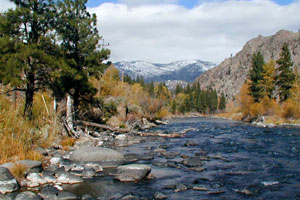 The Truckee River Canyon. Credit: Michael Conner.
The Truckee River Canyon. Credit: Michael Conner.
Natural capital isn't something we hear about very often, and it certainly isn't a new idea. Aldo Leopold and other conservationists recognized the role that natural ecosystems play in our lives as early as the 1940's. But understanding and measuring that role hasn't been easy. That's where the Natural Capital Project comes in.
The project focuses on ecosystem services - the natural processes that ecosystems provide and humans benefit from. Those include how forests filter our drinking water, how wetlands provide protection from storm surges, and how bees and other pollinators support our agricultural industry. While these services may not be the first thing you think of when it comes to nature, researchers are discovering that they're vital to human health and decision makers are starting to factor that it.
A few examples:
In the 1990's, New York City's water quality dropped below EPA standards. The obvious option was to built a new water filtration plant - with a hefty price tag: $6-8 billion for construction and $300 million in yearly operating expenses. Instead, the city decided to invest in the natural processes that help keep water clean. That meant looking upstream to the Catskills watershed where intact ecosystems could help filter the water. The city bought land upstream and improved sewer treatment plants - all at a much lower price: $1-1.5 billion.
